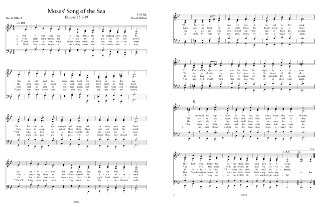In reading Puritan writings, I’ve learned some words they used back then don’t mean the same as today, or we just don’t use them at all anymore.
(On an aside, as a shame to myself, I should have read the Bible enough to have picked up on that before I did in Puritan writings. 🙁 )
And so, I thought for the benefit of those who use the King James version I might put together a small lexicon of old (olde 🙂 ) English words and what today’s version of the word generally or sometimes would mean. Not all of the words are always used in the way listed below but sometimes can be.
| Old English | Modern English | Scripture Example |
| conversation | behavior (sometimes this does mean or can include verbal communication as well) | 1 Timothy 4:12 – ” Let no man despise thy youth; but be thou an example of the believers, in word, in conversation, in charity, in spirit, in faith, in purity. ” |
| fain | be glad to, like to | Luke 15:16 – “And he would fain have filled his belly with the husks that the swine did eat: and no man gave unto him.“ |
| fool, foolish | wicked | Psalm 5:5 – ” The foolish shall not stand in thy sight: thou hatest all workers of iniquity. ” |
| importunity | persistence | Luke 11:8 – “I say unto you, Though he will not rise and give him, because he is his friend, yet because of his importunity he will rise and give him as many as he needeth.“ |
| let | prevent (modern definition) | 2 Thessalonians 2:7 – ” For the mystery of iniquity doth already work: only he who now letteth will let, until he be taken out of the way.” |
| list | desire, want (modern definition) | John 3:8 – “The wind bloweth where it listeth, and thou hearest the sound thereof, but canst not tell whence it cometh, and whither it goeth: so is every one that is born of the Spirit.“ |
| lust | corrupt desire (sometimes specifically does mean the baser kind, such as Matthew 5:28) | Psalm 78:18 – ” And they tempted God in their heart by asking meat for their lust . “ |
| mean | low (estate) | Proverbs 22:29 – ” Seest thou a man diligent in his business? he shall stand before kings; he shall not stand before mean men. ” |
| nought | nothing | Psalm 33:10 – “The Lord bringeth the counsel of the heathen to nought: he maketh the devices of the people of none effect.“ |
| ought | anything | Acts 24:19 – “Who ought to [should] have been here before thee, and object, if they had ought [anything] against me.“ |
| prevent | go before, anticipate | Psalm 88:13 – “But unto thee have I cried, O Lord; and in the morning shall my prayer prevent thee. “ Psalm 119:148 – “Mine eyes prevent the night watches, that I might meditate in thy word.“ |
| sensual | pleasing to the senses | James 3:14-15 – “But if ye have bitter envying and strife in your hearts, glory not, and lie not against the truth. This wisdom descendeth not from above, but is earthly, sensual, devilish. |
| so | in this way or manner, to this degree | 1 John 4:10-11 – “Herein is love, not that we loved God, but that he loved us, and sent his Son to be the propitiation for our sins. Beloved, if God so loved us, we ought also to love one another.“ |
| suffer | allow | Matthew 8:21 – ” And another of his disciples said unto him, Lord, suffer me first to go and bury my father. ” |
| vain, vanity | showy, empty, useless | Psalm 33:17 – ” An horse is a vain thing for safety: neither shall he deliver any by his great strength. ” Isaiah 41:29 – ” Behold, they are all vanity; their works are nothing: their molten images are wind and confusion. ” |
| vocation | the effectual, heart changing spiritual calling of grace | Ephesians 4:1 – “I therefore, the prisoner of the Lord, beseech you that ye walk worthy of the vocation wherewith ye are called,“ |
| want | lack | Job 31:19 – “If I have seen any perish for want of clothing, or any poor without covering; ” |
| without | outside | Genesis 6:14 – “Make thee an ark of gopher wood; rooms shalt thou make in the ark, and shalt pitch it within and without with pitch.“ |
| efficacious | effective, effectual | No verse, just sometimes used in the Puritan writings |
| essentially | of the essence of | No verse, just sometimes used in the Puritan writings Example: God is essentially good. [Good is of His essence] |
| obnoxious to | liable to | No verse, just sometimes used in the Puritan writings |
| stupid | like being in a stupor | No verse, just sometimes used in the Puritan writings |
I do plan to keep this updated if I find any others.
Also, a good resource for older versions of words, and that even uses Bible verses to demonstrate, is Webster’s 1828 dictionary. Here are hard copy and an online versions.
May the Lord guide us all in the studies of Him in His blessed word!
— David


-disp-200706.jpg)

